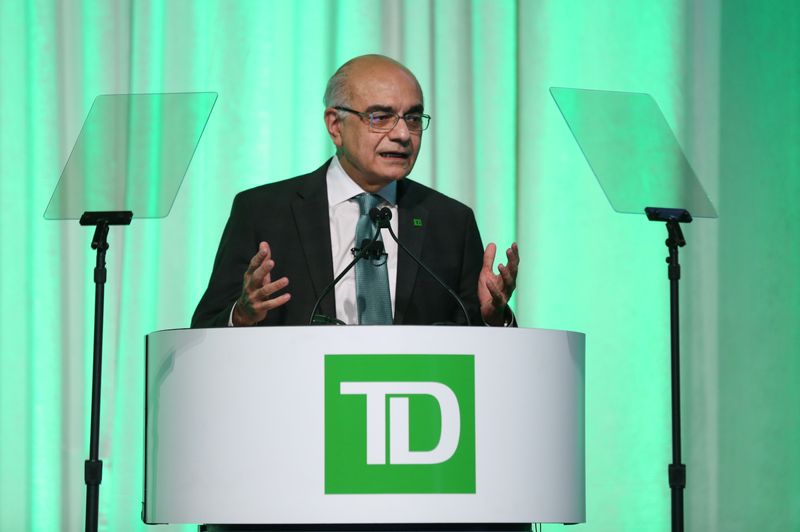By Nivedita Balu and Fergal Smith
TORONTO (Reuters) – Canada’s second-largest lender TD Financial institution’s efforts to resolve gaps in its anti-money laundering (AML) controls by the tip of the 12 months will possible clear the trail for a brand new CEO, probably an exterior candidate.
Ten shareholders interviewed by Reuters and two analysts stated a CEO change is imminent subsequent 12 months, with a majority floating the concept of an exterior candidate with data of the U.S. area who can begin with a clear slate after TD resolves its AML points with U.S. regulators.
Final week, TD introduced it put apart a complete of $3 billion to cowl fines from U.S. regulators which have been probing weaknesses within the lender’s cash laundering controls and hopes to discover a international decision of the civil and legal investigations by the tip of the calendar 12 months. The penalties might result in one of many largest fines ever paid by a Canadian financial institution abroad.
TD CEO Bharat Masrani took the highest job in November 2014 at a time the financial institution was in fast enlargement mode and targeted on the U.S. market the place it now has about 1,150 branches on the east coast, extra branches than it has throughout Canada.
The probe by U.S. regulators together with the Division of Justice, that got here after the termination of its $13.4 billion deal to purchase U.S.-based regional lender First Horizon (NYSE:), prolonged Masrani’s keep on the high seat.
After the financial institution acknowledged the AML points, shareholders stated they most well-liked Masrani see the investigations by way of earlier than handing over the baton to a brand new chief.
The departure of CEO contender Michael Rhodes left many with questions round CEO succession plan, raised at current analyst calls and different occasions.
Ben Jang, a portfolio supervisor at Nicola Wealth, a TD shareholder, expects CEO change subsequent 12 months, probably an outsider.
“Once we get past these rocky waters, and there is a little bit of light at the end of the tunnel, maybe that will help create more clarity for leadership change,” Jang stated.
In response to a request for remark, TD stated it has a strong succession planning course of. “Our senior executive bench is strong.”
‘CULTURAL SHAKE-UP’
BofA Securities analyst Ebrahim Poonawala stated buyers’ want for a “cultural shake-up” would possible require an exterior rent for the CEO function.
Canadian banks have up to now usually promoted internally, besides Financial institution of Nova Scotia, which named board member Scott Thomson, former CEO of Caterpillar (NYSE:) seller Finning, as its chief final 12 months.
Whereas TD’s record of potential candidates is unclear, shareholders stated a candidate with a deep understanding of Canadian banks, maybe from the U.S., who might assist steer TD’s progress plan south of the border, could be perfect.
Potential inside candidates embrace Leo Salom, who heads its U.S. retail enterprise, Riaz Ahmed, the pinnacle of its capital market division, and Canada private banking head Ray Chun, shareholders stated.
At 68, Masrani is older than his predecessor, Ed Clark, when he retired, and the oldest CEO amongst Canada’s large six banks.
As soon as racing with Royal Financial institution of Canada for probably the most valued Canadian firm within the 2000s, TD’s inventory has gained 44% since Masrani took cost, in comparison with larger rival RBC’s 95% achieve throughout the identical interval.
TD final week stated it could discover a international decision associated to its anti-money laundering lapses. The supply of $2.6 billion within the fiscal third quarter resulted within the first loss TD recorded since 2003.
The decision would additionally embrace non-monetary penalties, TD stated.

If the penalty is one thing as extreme as an asset cap, TD could be higher off with an exterior candidate, stated Anthony Visano, managing director at Kingwest & Co, a TD shareholder.
“As much as I don’t like the idea of an external candidate, potentially someone handcuffed in terms of strategy, they should come from outside the bank as the focus ought to be on capital returns, as capital deployment wouldn’t be an option in the U.S.”




